Protests Erupt In Iraqi Kurdistan After IRGC Missile Attack
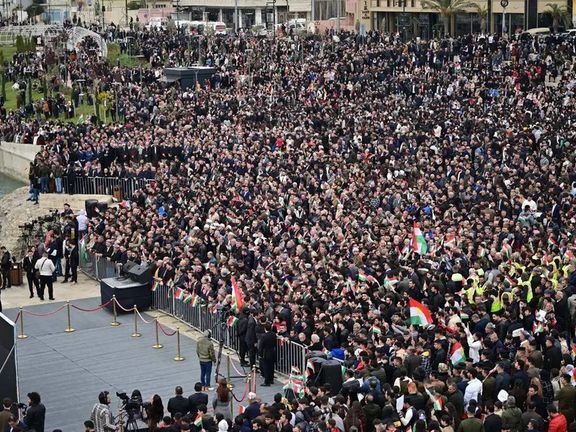
Thousands took to the streets in the Kurdistan region of Iraq on Sunday to denounce the IRGC missile attack on Erbil which killed four civilians and injured six others.

Thousands took to the streets in the Kurdistan region of Iraq on Sunday to denounce the IRGC missile attack on Erbil which killed four civilians and injured six others.
The IRGC launched ballistic missiles on Erbil last Monday citing the destruction of alleged "spy headquarters" and the dispersal of "anti-Iranian groups" as its objectives, causing a diplomatic furore in its wake. Iraq summoned Tehran’s chargé d’affaires in Baghdad to condemn the move and withdrew its ambassador from Tehran.
Hassan Hassanzadeh, the commander of the IRGC in Tehran, declared that the strikes were executed under the orders of Ali Khamenei, the Supreme Leader of the Islamic Republic.
While the IRGC claimed to have targeted a Mossad headquarters in the Kurdistan region of Iraq, referring to Israel's spy agency, Masrour Barzani, the Prime Minister of the Kurdistan Region categorically denied Iran's claims. Barzani condemned the attack on Erbil as a “crime against the Kurdish people,” accusing Iran of killing innocent civilians in its missile strikes.
The Arab League condemned the IRGC's attack, characterizing it as a “blatant aggression on the sovereignty of Iraq.” The condemnation rejected all "justifications and pretexts" put forward by the Islamic Republic for the attack, emphasizing the potential threat it poses to regional peace and security.
In a press conference on Monday, Naser Kanaani, the spokesman for the Iranian Ministry of Foreign Affairs, said the attacks were due to "tangible threats to Iran's national security" suggesting an imminent threat on its border.
Iraqis have since initiated a campaign to boycott Iranian products, encouraging the substitution of Iranian goods with locally-produced or Arab alternatives.
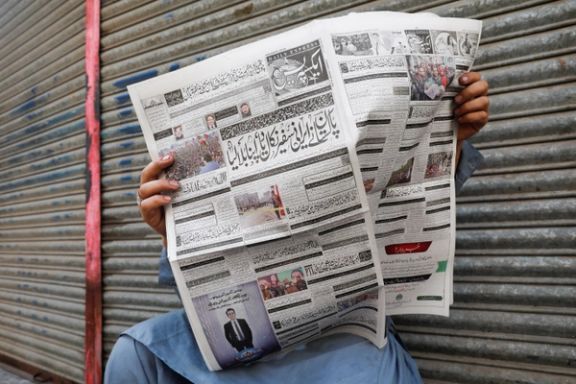
After last week’s IRGC missile and drone attack in Iraq and Pakistan, tensions remain high with both countries, despite Tehran’s attempts to show an air of normality.
Tehran has tried to quash talk of trouble with Pakistan, but Pakistan's Counter-Terrorism Department (CTD) has said it arrested a suspect in the 2019 assassination attempt on a top Pakistani cleric, saying the suspect is a "trained terrorist" who belongs to the Zainebiyoun Brigade, a militant group of Pakistani Shiites created by Iran to fight in Syria.
Pakistan’s CTD said that Syed Mohammad Mehdi was arrested in an operation at a bazaar in Karachi, accusing him of targeting clerics in the provincial capital and of working for Iranian intelligence.
This seems to be a signal by Islamabad that not everything is resolved with Iran, and the Pakistani government remains vigilant about any further actions by Tehran.
Similarly, Kurds in Iraq held a large protest rally on Monday to condemn Iran’s ballistic missile strikes on their capital Erbil a week ago that killed a Kurdish businessman.
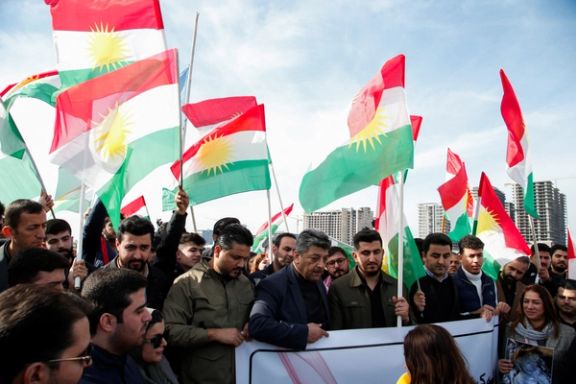
Khuram Waris, who heads the CTD in Karachi, told Radio Mashaal that Mehdi is a Pakistani citizen who received training in a "neighboring country”, implicitly pointing the finger at Iran. He said:” He is a member of the Zainabiyoun Brigade. He was involved in many attacks, including the attack on Mufti Taqi Usmani in Karachi."
Usmani, a religious scholar and former top court judge in Pakistan, narrowly escaped an assassination attempt in Karachi in 2019. Two of Usmani's bodyguards were killed in the attack, for which no group claimed responsibility.
The IRGC’s January 16 attacks against Jaish al-Adl, a US designated terrorist group accused by Tehran of carrying out deadly attacks in Iran, were justified by Tehran as its "legitimate and legal right to deter national security threats."
Pakistan condemned the strike on its territory and responded on January 18 with air strikes against separatist groups allegedly hiding out on Iranian territory.
In Tehran, the government is trying to act as if it is business as usual, but the tension is palpable. Foreign Ministry spokesman Nasser Kanaani said that while the recent attack on “terrorist bases” was due to what he called “an immediate necessity to deal with terrorists ready to operate”, suggesting an imminent attack had been thwarted, he stressed that relations between the two nations are “strong and fraternal”.
Addressing the media, he said: “Terrorism is a common threat of both sides, and Tehran and Islamabad emphasize on fighting it, and the recent action cannot create a disruption in the relations between the two countries.
But as Pakistan continues to claim the terror on its soil is backed by the Iranian government itself, the question remains as to how diplomatic relations move forward.
In a span of 24 hours, Iran’s IRGC launched missile and drone strikes on three neighboring countries, claiming ‘revenge’ for civilians and troops killed in the past few weeks. Having hit several locations in Syria and Iraqi Kurdistan Monday, Pakistan was the final country to feel the wrath of Iran’s Quds Forces.
Pakistan swiftly responded by a targeted assassination of IRGC Colonel Hossein-Ali Javdanfar, killed in a car near the Pakistan border. Two of his bodyguards were also killed.
The incident led to both Iraq and Pakistan withdrawing its ambassadors and Pakistan threatening to permanently close borders. The issue has also been raised to the Arab League which is set to hold an emergency meeting in the coming days or weeks.
The Sunni group, Jaish al-Adl, could just be the fan to the flames of a relationship which was never entirely on solid ground and with the latest attacks on Pakistan, look to face a troubled future.
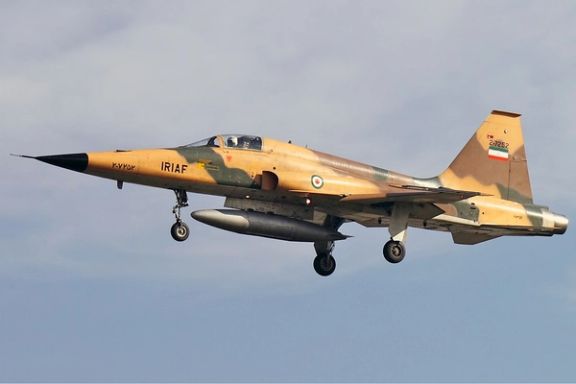
In the wake of a huge sound echoing through the industrial zone of Garmsar, officials claim the noise was merely the sonic boom produced by a fighter jet breaking the sound barrier.
In a bid to calm fears, the state news agency IRNA, citing an anonymous source, reported on Monday that the “terrifying sound experienced in Garmsar was a result of the breaking of the sound barrier by a fighter jet.” The incident unfolded at approximately 9:15 local time, with the audible disturbance reaching the airspace of Garmsar, it added.
While IRNA did not disclose the affiliation of the fighter jet, the Islamic Republic of Iran Broadcasting (IRIB) referred to the aircraft as "educational" without specifying its organizational ownership.
Ahmad Rivadeh, the political, security, and social deputy of the Semnan governor, stated that the sonic boom occurred during a training flight mission. “Investigations are underway to determine the exact cause of the incident,” he claimed.
Behnam Bakhtiyari, head of the industry and mining office in Garmsar, earlier confirmed the sound of an explosion but stressed that the cause remains unknown. However, Governor Reza Khani asserted that no explosions occurred in any part of the city.
Since mid-2020, a series of explosions and fires have plagued various Iranian military, nuclear, and industrial sites, including pipelines and refineries.
One year ago, a blaze engulfed an Iranian military industrial factory in Esfahan, with suspicions pointing towards a drone strike as the cause.
Although authorities have not offered exhaustive clarifications for the incidents, they have linked several prominent sabotage attacks on facilities to Israel.

The US-based Human Rights Activists News Agency (HRANA) claims that at least 90 people were executed in the past Iranian month (December 22 to January 20) alone.
The figures mean that Iran has been catapulted to the top spot globally for the highest per capita execution rate.
The statistics show that on average, Iran carried out three executions per day throughout the past month, showcasing a disregard for the fundamental right to life within the Iranian judicial system.
Among the events highlighted in the report is the execution of Vafa Hanareh, Aran Omri, Rahman Parhazoo, and Nasim Namazi in Urmia Prison on December 29th. The prisoners faced charges of "moharebeh (War against God) and corrupting the earth through espionage for Israel."
HRANA claim that over 75% of executions in Iran remain unreported by government or judicial entities, often characterized as "secret executions" by human rights organizations.
HRANA's recent annual report also revealed a surge in executions in the wake of the 2022 uprising, sparked by the death in morality police custody of Mahsa Amini. In 2023 alone, at least 791 citizens, including 25 women and 2 child offenders, were executed, marking a shocking 33% increase compared to the previous year. Seven of the executions were conducted in public.
According to Amnesty International, from January 2012 to July 2023, over five thousand people, including at least 57 children, have faced execution in Iran.

Iran’s manufacturing industry is in decline as reports attribute plummeting sales to a substantial drop in demand hitting businesses both domestic and export markets.
According to a report by Iran's leading economic newspaper Donyaye Eghtesad (World of Economy), production-related issues such as raw material shortages and difficulties in securing foreign currency, have led to the suspension of many production units.
Soaring inflation, reduced consumer purchasing power, and a decline in demand for intermediate goods (also known as producer goods or semi-finished products), coupled with the government’s contractionary approach to the industrial sector and its interventions, have exacerbated the downturn in sales.
Highlighting the stagnation and lack of sustainable growth in the manufacturing sector, the newspaper said the government’s target economic growth rate of 8% is far from reality. Citing official statistics, the report said that the growth of Iran’s industrial and mining sector last summer was 8.7% when including the oil sector, but excluding oil, it had a negative growth of 0.4% compared to the same period the previous year. It added that the unstable growth trajectory of the industrial sector in the current Iranian year (started March 21, 2023) impacted the industrial sector's contribution to overall economic growth, decreasing from 0.8% to 0.3%.
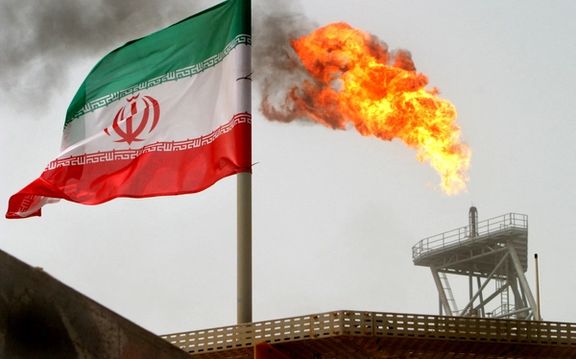
The daily used two data sources for its analysis, a report by the Iran Chamber of Commerce on the country’s Purchasing Managers' Index (PMI) and a report by the Parliament Research Center. Examination of industrial companies listed on the stock exchange also reveals a decreasing trend in the growth index of these companies' sales, reaching the lowest point in the current season since the winter of 2021. Additionally, the production index of these industrial companies is nearly at its lowest point in the last two years, further proof of a recession in Iran's industries and manufacturing.
The Chamber of Commerce’s PMI report also revealed that weak domestic demand and a decrease in exports have led manufacturing companies to register a reduction in the Customer Sales Index (45.27) for the sixth consecutive month in December. The PMI, an index of the prevailing direction of economic trends in the manufacturing and service sectors, is based on a monthly survey of supply chain managers across dozens of industries.
The ongoing trend of reduced purchasing power and customer liquidity constraints on one side, and a decline in export sales due to the government’s inefficient regulations on the other, have led to a situation that exports cannot serve as a viable replacement to make up for weakened domestic demand, Donyaye Eghtesad noted.
According to the newspaper, economic experts argue that in addition to reduced consumer purchasing power and a a 50-percent annual inflation rate, the decline in industrial sales is the result of government interventions in foreign currency and export matters, inadequate financial support from banks for industries, and discrimination among sectors in terms of allocation of resources.
Abbas Jabalbarghi, the Vice President of the Industries Committee of the Iran Chamber of Commerce, told the daily that “the government must refrain from interfering in the manufacturing sector." Noting that “its intervention in foreign currency regulations and rates has had a detrimental impact on production, subsequently affecting the overall economic cycle and the money supply.”
The report also underlined that analysts believe the Islamic Republic’s foreign policy and isolation from the international trade market due to various US and international sanctions have also played a significant role, further restricting Iranian industrialists.
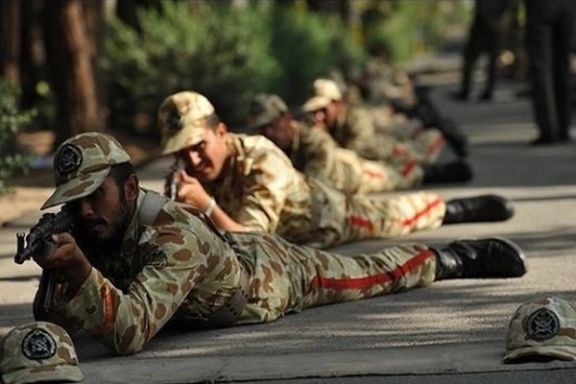
An army conscript who killed five colleagues in the squad room while on duty in Kerman barracks, has been apprehended near Zarinshahr county, officials say.
Naser Farshid, commander of law enforcement in Kerman province revealed that “the apprehended soldier was found in possession of two Kalashnikov rifles and six magazines containing a total of 180 rounds.” His motive is currently under investigation.
Citing the Islamic Republic Army, Tasnim News Agency has released the names of the five conscripted soldiers who lost their lives in the shooting.
The incident follows earlier reports in Iranian media about soldiers resorting to violence against their comrades or military authorities during their service. The motives behind such incidents are not officially disclosed by the military authorities of the Islamic Republic.
In a similar incident last year, a soldier in a barracks in the city of Deylam killed four other soldiers after taking them hostage. Iranian media attributed the soldier's motives for the killings and hostage-taking to not having been allowed to take leave.
Military service in Iran, known as "compulsory military service," is obligatory for all Iranian men above the age of 18, with certain exemptions. The mandatory 21 to 24-month service has faced criticism due to the physical and psychological pressures on soldiers, sometimes leading to outcomes such as suicide or violent acts.